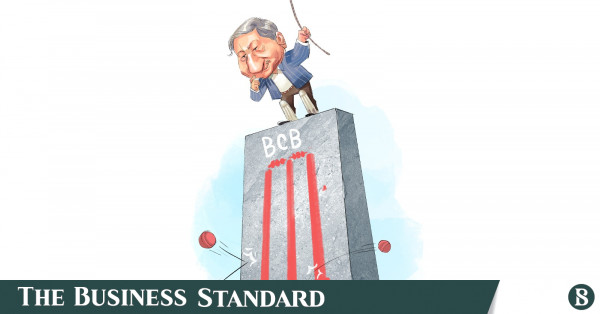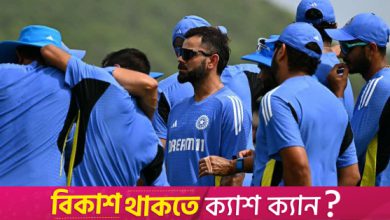An unchallenged Papon at the crux of what ails Bangladesh’s cricket

Cricket has long been more than just a sport in Bangladesh; it is a passion that unites the nation.
However, under the nearly 12-year tenure of Nazmul Hassan Papon as the Bangladesh Cricket Board (BCB) President, this passion has been marred by disarray, inadequacies, and a glaring lack of progress in local cricket infrastructure.
Papon has served as the BCB president since 2012 when he was nominated for the position by the government and has remained in power after three elections in 2013, 2017, and 2021.
The BCB’s election process is designed so that most of the elected directors are like-minded, making the election of the president more of a formality with their votes.
Additionally, as the son of the late President Zillur Rahman and a close associate of former Prime Minister Sheikh Hasina, Papon has faced no real opposition in the BCB’s governing body.
This unchecked dominance has allowed him to inundate the country’s cricket with his unwarranted ‘affection.’
As a result, under Papon’s leadership, Bangladesh’s domestic cricket team has not seen the required growth, especially given the amount of money it generates.
The Bangladesh Premier League (BPL), the country’s premier franchise tournament, has been marred by controversies since its inception.
The most notable scandal was the 2013 match-fixing incident involving former national captain Mohammad Ashraful.
Subsequent years have seen additional allegations, including the 2016 incident with Rangpur Riders’ Jupiter Ghosh, the Sylhet Strikers being approached by a bookmaker in 2023, and a 2024 claim of Shoaib Malik’s contract termination over fixing allegations, which the player later denied.
The state of first-class cricket is similarly troubling, as recent Test performances have highlighted serious flaws in the system.
Former captain Mominul Haque has recently criticised the disparity between domestic and international cricket, noting that the gap in quality is stark and the challenges faced in domestic cricket are vastly different from those on the global stage.
The number of first-class matches played in Bangladesh’s domestic cricket is significantly lower compared to other countries.
Shakib Al Hasan highlighted this issue in 2022, noting that players typically compete in only 8-10 first-class matches per year.
Currently, Bangladesh has two first-class tournaments: the National Cricket League (NCL) and the Bangladesh Cricket League (BCL).
In the NCL, eight teams are divided into two tiers, with each team playing six matches per season under a double-league system.
The BCL, a four-team tournament, uses a round-robin format followed by a final, allowing each team a maximum of four matches.
This adds up to approximately 10 first-class matches per season for each player and is insufficient for developing top-tier talent.
During Papon’s tenure, the Dhaka Premier League (DPL), once a vibrant and competitive platform, has witnessed the rise and rise of Abahani while other clubs suffered for various political and economic reasons.
Clubs like Surjo Torun and Eskaton Sabuj Sangha, which once nurtured talents such as Mohammad Ashraful and Mehidy Hasan Miraz, have faded into obscurity, crushed under the weight of toxic politics and biased officiating that now dominate the league.
The increase in the entry fee for Third Division Selection Cricket from one lakh takas to five lakh takas has further eroded the foundation of Bangladesh’s domestic cricket.
This exorbitant fee hike has effectively barred many academy teams from participating, leading to a significant drop in the number of teams and young players entering the system.
In 2012, 84 teams participated in the selection round of Third Division cricket, but by 2014, this number had plummeted to just 14.
The loss of these platforms has denied thousands of young cricketers the opportunity to showcase their talent, contributing to a shrinking talent pool that is now evident at the national level.
Moreover, the BCB’s questionable electoral practices have entrenched a culture of favouritism and corruption, as board officials have systematically favoured select clubs to maintain their grip on power.
This has led to the rise of mushroom-like clubs created by BCB officials, while legitimate clubs that meet all the BCB’s conditions are sidelined.
The result was a deeply flawed system where biased umpiring and match-fixing had become rampant, further undermining the integrity of the game.
Things did take a slight turn for the better with umpiring improving in recent years after a lot of controversies and with BCB’s Youtube channel showing more domestic matches.
The impact of this mismanagement is evident in the national team’s struggles.
Despite occasional successes, Bangladesh’s cricket has not progressed at the rate expected of a nation with such a passionate fanbase.
The absence of quality players in the pipeline is alarming, and it is a direct consequence of the neglect and decay in domestic cricket under Papon’s leadership.
Furthermore, Papon’s tenure has been characterised by a stark imbalance in the distribution of international matches, with the majority being played at the Sher-e-Bangla National Cricket Stadium in Dhaka.
Other venues, such as the Khan Shaheb Osman Ali Stadium in Fatullah, the Shaheed Chandu Stadium in Bogra, and the Sheikh Abu Naser Stadium in Khulna, have been neglected, depriving these regions of the opportunity to host international cricket and develop local talent.
The lack of investment in maintaining and upgrading these stadiums has left them in disrepair, further limiting the opportunities for cricket to flourish across the country.
One of the most concerning outcomes of Papon’s extended tenure is the diminishing pipeline of quality cricketers.
The persistent exclusion of deserving clubs and academies from domestic cricket has drastically reduced the pool of players prepared to transition to the national level, leaving the Bangladesh cricket team struggling to find suitable replacements for stalwarts like Shakib, Tamim Iqbal, and Mashrafe Mortaza.
This issue has been highlighted by cricket fans and experts alike.
As Abdullah Al Mamun, a member of the Welfare Cricket Association, pointed out during a protest on 13 August at Mirpur’s Home of Cricket.
“The BCB has 900 crore taka, but there are no cricketers in the pipeline.”
Mamun’s comments reflect the frustration felt by many who see the same players rotating through the national team, the Bangladesh Tigers, and the HP unit, without any new talent emerging to challenge them.
The impact of this shrinking talent pool is already being felt.
Despite strong performances in the Dhaka Premier League (DPL), cricketers like Anamul Haque Bijoy or Naim Sheikh have struggled to make their mark at the international level, highlighting the gap in quality between domestic and international cricket.
The situation has become so severe that some players have left the game in frustration, while others have taken extreme measures to protest.
A notable example is the infamous no-ball incident in 2017 during the Dhaka Second Division Cricket League, where Lalamatia Club’s Sujon Mahmud deliberately bowled 15 no-balls and 13 wides, conceding 92 runs from just four legitimate deliveries. This drastic protest against poor umpiring drew international attention for all the wrong reasons.
Under Papon’s leadership, the board has also been indifferent to outside perspectives as renowned coach Najmul Abedin Fahim said, “It’s essential that the new board listens to outside perspectives. The previous board lacked this openness.”
Given the current state of Bangladesh cricket, it is clear that new leadership is necessary to revitalise the sport in the country.
With Nazmul Hassan Papon no longer serving as the Minister of Youth and Sports following the fall of the recent government led by student protests, the appointment of Asif Mahmud Sajib Bhuiyan as the new Sports and Youth Adviser offers an opportunity for a fresh start as wicketkeeper-batter Nurul Hasan Sohan said, ”We need someone at the helm who is genuinely passionate about the game, whose integrity is beyond question”
While the International Cricket Council (ICC) does not explicitly prohibit a board president from holding a government position, the situation in Bangladesh calls for a reassessment of Papon’s role as BCB president.
The ICC’s regulations state that a board president must voluntarily resign if they choose to step down, and the BCB’s constitution provides a clear process for selecting a new president.
However, with the vice-president position currently vacant and no interim president in place, the BCB must address this leadership vacuum before further damage is done.
The current trajectory of cricket in the country is not growing as well as it should, and without immediate changes, Bangladesh risks falling further behind on the international stage.
The fans, the players, and the nation deserve better.





